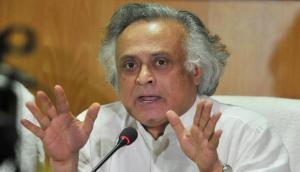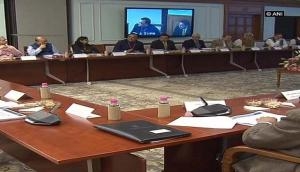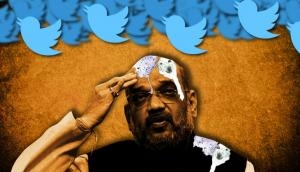
To mark his two years in office, the Narendra Modi government published elaborate front page ads on every leading newspaper on Thursday recounting the success of its flagship schemes like Jan Dhan Yojana, Beti Padhao, Beti Bachao etc. Going by the full page ads, it seems like India can proudly go back to calling itself pre-British era's 'sone ki chidiya' (Golden bird).
However, for the common man there are only two parameters to judge the government's performance:
1. Aate, dal ka bhaw (the colloquial Hindi term for price rise) and tax benefits.
2. The civil society's actual, tangible freedom to register its protest and disenchantment with the government.
The government didn't really fare very well on the first count. As for the second question, you might be able to answer it yourself after taking a look at the following five instances:
1. Offloading Greenpeace activist Priya Pillai while she was travelling to the UK in January 2015
Pillai was stopped at the Delhi IGI airport on 11 January. She was on her way to London to speak on the alleged violation of forest rights of tribals in the Mahan coal block area of Madhya Pradesh.
She was later told that her name figured on a 'lookout circular' issued by the Ministry of Home Affairs. Pillai's passport was stamped with the word 'Offload'. Later, the government had to face embarrassment as the court overturned her offloading and slammed the government for cracking down on dissent.
Greenpeace has been at the receiving end of government scrutiny since June 2014, when a leaked report from India's Intelligence Bureau had termed NGOs opposing the government's energy policies as "acting against national interest" and suggested action against them, including blocking their access to overseas funding. Following this, the government blocked Greenpeace India's access to money from Greenpeace International.
2. Banning the documentary 'India's daughter' in 2014
It is interesting how a documentary on one of the most brutal rape cases reported in the media became a topic of discussion in the Parliament. Leslee Udwin's documentary courted controversy because of an interview with one of the convicts and his lawyer.
Even before the documentary was aired and its contents revealed, Home Minister Rajnath Singh made a statement in the Parliament asking the Information and Broadcasting Ministry to ban it. The documentary, that was to be aired on BBC, was banned in India but the rest of the world did see it. It was also available online.
The government based the ban on procedural lapses and cited legal reasons. But the ban was largely a response to the outrage of people who thought that the documentary would damage India's image worldwide.
This line of action was in perfect alignment with what Finance Minister Arun Jaitley had said in August 2014: "One small incident of rape in Delhi advertised world over is enough to cost us billions of dollars in terms of global tourism." However, in the end, the ban did create global interest in the documentary.
3. Dropping Aamir Khan as brand ambassador of Incredible India following his remarks on increasing intolerance in India
The 'award wapsi' and the intolerance debate haunted the government for a long period. Around the same time, actors Aamir Khan and Shahrukh Khan were asked whether they thought that India was becoming more intolerant. Both answered in affirmative. Aamir Khan went a step ahead and said that his wife Kiran Rao wondered if they should leave the country owing to the growing intolerance in the country.
Not only did Modi's evergreen motormouths like Sadhvi Prachi and Yogi Adityanath make scathing comments against the couple, several ministers within the government slammed the comment. However, the animosity towards the duo did not end here.
Calls by right-wing groups to boycott their movies started doing the rounds. Soon after the controversy, Aamir Khan was removed as the brand ambassador of the Incredible India campaign.
He had been the face of the campaign since 2007 and a successful at that one. Although the culture ministry never gave any reason for the termination of his contract, many BJP leaders like Manoj Tewari said that having criticised India on moral grounds, Aamir Khan wasn't a fit person to represent Incredible India.
4. Charging JNU students Kanhaiya and Co with sedition
A controversial event on 9 February 2016 organised on JNU campus became the ground for a prolonged fight between a section of the JNU students and the government. The concerned event was held to commemorate the hanging of Afzal Guru.
Questionable slogans were raised at the event. Notably, this was not the first time that JNU students were organising such an event.
However, instead of letting the university authorities take action, the government swooped in and arrested Kanhaiya Kumar, the JNUSU president. Later, two other students -- Umar Khalid and Anirban, were also arrested on the same charges. Murky reports of doctored videos and campus politics also emerged. The court released the students on bail, observing that they had no criminal background.
5. Notice to television channels
The government had issued show cause notices to three channels -- NDTV, Aaj Tak, and ABP News for their coverage of 1993 Mumbai blast convict Yakub Memon's hanging in August 2014. The Indian Express reported that the I&B Ministry obtained the video clips of the Chhota Shakeel phone-in and Yakub's lawyer's statement from the Electronic Media and Monitoring Centre (EMMC) that scans all channels on 24/7 basis.
EMMC is a department under the ministry which monitors around 600 channels, also submits reports related to the coverage of important events. There were previous instances of censorship by the NDA government like NDTV Good Times and TLC being taken off the air for a day for 'adult' content. Al Jazeera too was blanked out for five days for showing a wrong map of India where Jammu and Kashmir were not shown as integral part of the country.







![BJP's Kapil Mishra recreates Shankar Mahadevan’s ‘Breathless’ song to highlight Delhi pollution [WATCH] BJP's Kapil Mishra recreates Shankar Mahadevan’s ‘Breathless’ song to highlight Delhi pollution [WATCH]](https://images.catchnews.com/upload/2022/11/03/kapil-mishra_240884_300x172.png)

![Anupam Kher shares pictures of his toned body on 67th birthday [MUST SEE] Anupam Kher shares pictures of his toned body on 67th birthday [MUST SEE]](https://images.catchnews.com/upload/2022/03/07/Anupam_kher_231145_300x172.jpg)






